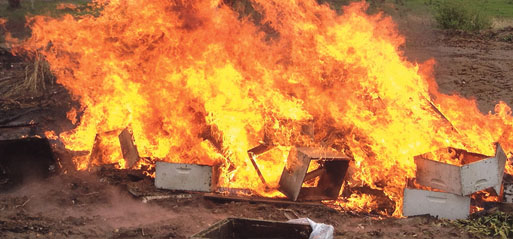
Beehives with American foulbrood are burned because the spores can live for up to 40 years. (Credit: Jrmgkia/WikiCommons)
The US Food and Drug Administration has conditionally approved the first-ever vaccine for honeybees. The vaccine is meant to protect against the American foulbrood (AFB) bacterium, which can rapidly decimate entire bee colonies. Launched by Dalan Animal Health, an American biotech company in the state of Georgia, the vaccine is administered to the food source of the queen bee, which will then pass immunity onto her offspring.
The vaccine is the first of its kind and may pave the way for future insect vaccines. Honeybees are vital to global food production, but populations have become threatened by climate change, habitat destruction, and disease.
Pollinators, including honeybees, native bees, and flies contribute hundreds of billions of dollars in economic value to global food production, and manual pollination would cause food prices to skyrocket. The Weather Channel reports that bee populations have declined by 90 per cent since 1962.
The loss of pollinators has led to reduced crop yields, higher prices, and an estimated 500,000 human deaths per year due to a lack of access to nutrient-dense foods. Globally, 80 per cent of food and industrial agricultural products require animal pollination. The decline of natural pollinator populations is of grave concern to farmers.
Dalan Animal Health is working on producing other insect vaccines, including for European foulbrood (EFB), an AFB/EFB combination, and the fungal chalkbrood.
The Varroa mite is another parasitic bacterium that decimates thousands of bee colonies each year.
In 2022, Australian beekeepers were forced to burn hundreds of hives infected with varroa mites, which can only reproduce in beehive colonies. A recent study showed that sunflowers may reduce varroa mite infestations in honeybees, though more research is needed for a thorough understanding of causation.
In the US, 40 per cent of American bee colonies die each winter.
The AFB vaccine brings optimism to beekeepers, but the disease is only one reason for pollinator decline.
A study by Alison McAfee, a PhD student at the University of British Columbia, shows that extreme heat waves can impair the fertility of honeybees and even kill them. Soaring temperatures in Canada during the June 2021 heat wave killed off 50 per cent of male honeybees that had been exposed to 42 °C for six hours. After two hours of exposure at the same temperature, male honeybee fertility declined by one-third.
Global temperature rises caused by climate change may reduce pollinator populations further. According to the National Oceanic and Atmospheric Administration (NOAA), 2022 was one of the six warmest years on record. If temperatures continue to rise, the disease may become less of a concern for pollinator populations.
Climate change’s effects extend beyond temperature increases; they have already been attributed to more intense natural disasters, including heavier rainfall and flooding, wildfires, and droughts, all of which can affect bees’ foraging patterns. A change in foraging patterns, where pollinators linger longer in one place, may also give diseases a better opportunity to spread among colonies.
Honeybee populations have also declined due to the overuse of chemical pesticides, which can disrupt the insects’ learning and memory. At high exposure levels, pesticides can reduce the viability of male honeybee sperm and impair reproduction.
Recognizing that bees are vital to maintaining ecological biodiversity, one of the goals set for 2030 at last year’s COP15 Biodiversity Conference in Montreal was to “reduce by half both excess nutrients and the overall risk posed by pesticides and highly hazardous chemicals.”
The vaccine targeting the American foulbrood bacterium is a step towards fighting one of the forces decimating honeybee populations, but comprehensive solutions to climate change’s other effects cannot be devised in a lab.
The continued destruction of pollinators’ habitats, the increase in global temperatures, and the overuse of chemical pesticides make such a breakthrough a drop in the bucket. Overreliance on scientific solutions may lure policymakers into a false sense of calm over the climate crisis.
While economists have attempted to quantify the economic value of the work pollinators do, its importance to global food systems is priceless. Concerted efforts by national governments that educate the public and involve them in improving habitats, by planting native plants that attract bees and butterflies, may offer long-term benefits to pollinator populations.
Sarah Sakeena Marshall,
American University’s School of Intl Service, The Muslim News Environmental Columnist